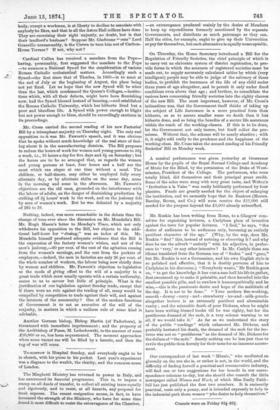Mr. Cross carried the second reading of his new Factories'
Bill by a triumphant majority on Thursday night. The only real -opposition to it was Mr. Fawcett's speech, and it was obvious that he spoke without much knowledge of the real state of feel- ing about it in the manufacturing districts. The Bill proposes to reduce the hours of work for women and young persons to 56i a week, i.e., 10 hours a day for five days and si on Saturday ; but the hours are to be so arranged that, as regards the women aud young persons at least, four hours and a half are the most which can elapse at one time without a meal. The children, or half-timers, may either be employed fully every alternate day, or by alterhate shifts on the same day, some in the morning and some in the afternoon. Mr. Fawcett's -objections are the old ones, grounded on the interference with the labour of adults, on the danger of diminishing production by striking off 3 hours' work in the week, and on the jealousy felt by men of women's work. But he was defeated by a majority .of 295 to 79.


































 Previous page
Previous page